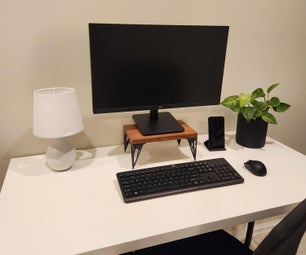Introduction: Mobile Ultimaker Rucksack
Here's my guide how to get your Ultimaker mobile! I try to illustrate the two parts as clearly as possible.
First we look into how to mount some rucksack straps without damaging your Ultimaker and then we'll look into the electronics you need to power it autonomously. To get you motivated we start off with a round of photos from EuroMold and FabCon where I used this setup to attract quite some attention:
- Guerrilla Marketing @ EuroMold 2012 in Frankfurt, Germany: https://plus.google.com/photos/116416453568555193...
- FabCon 3.D Flashmob in Jena, Weimar & Erfurt, Germany:
Let's get started...
Step 1: Step 1: How to Mount the Rucksack Straps
This is fairly easy... let's break it down in a couple of steps:
- Get yourself an old/used/broken/cheap rucksack at eBay.
- Cut off the straps.
- Make sure you get enough of the fabric, the more the merrier.
- You can cut off remains later in the process.
- Use glue or a lighter to prohibit frazzling, but I had never problems with it so far.
- Decide for a side to carry it. After long experimentations the best side is the one with the USB/Power connector.
- Mount the straps.
- Don't drill any new holes into your beautiful Ultimaker!
- Instead: sCleverly reuse existing holes.
- Depending on the shape of your straps and the thickness of the fabric you can use the very top row of screws (which hold your frame together), or one of the one which hold the end-caps in place (YES, I know it's a pain to loosen and tighten them later... don't use the one in the outside corners. It's really hard to get in the nut back in later. For the bottom part, just use the lowest screw on the left and right side of the Ultimaker.
- You need screws which are a bit longer (depending on the thickness of your fabric) than the original ones.
- Use screws with thick heads and make use of plenty of washers to ensure a tight fit.
- I've used 2-3 screws on the top of EACH strap and 1 screw on the bottom of EACH strap. That worked perfectly. On one machine I went lighter on the top row (3 in total).
- Just make sure you don't drop your machine while being mobile! Washers and proper screws are key to success.
- Done! Off to the next part.
Step 2: Step 2: the Battery Setup
The hardest part will be to solder a piece of wire... but first get in all required components.
Shopping list:
- Safety first (PLEASE BUY THESE!)
- Battery Alarm (most important!): http://hobbyking.com/hobbyking/store/__18588__Hob...
- You find also plenty of them on eBay (make sure to take one which is compatible with >= 5S batteries)
- Make yourself familiar with LiPo batteries. If you discharge them too much they blow up and burn down your house. This happens very often
- SO PLEASE READ THE MANUAL and use the battery alarm to get noticed when it's empty and needs to be charged.
- LiPo Charging bag (adds a bit of safety, but it's better to charge them outside within a big clay pot): http://hobbyking.com/hobbyking/store/__4364__Lith...
- Battery packs:
- Type: LiPo
- Cells: 5S
- Rating: >=20C
- Recommended Capacity >= 5000 mAh (gives you around 1:30h of print time)
- e.g. "ZIPPY Flightmax 5000mAh 5S1P 20C": http://hobbyking.com/hobbyking/store/__8581__ZIPP... (dirt cheap - probably the best deal out there)
- Connectors:
- - Matching connector for the batterys (HXT4mm style, ESC side): http://hobbyking.com/hobbyking/store/__24423__HXT...
- - Matching connector for the batterys (HXT4mm style, ESC side): http://hobbyking.com/hobbyking/store/__24423__HXT...
- Cables:
- 1x Black: http://hobbyking.com/hobbyking/store/__9679__Turn...
- 1x Red: http://hobbyking.com/hobbyking/store/__9678__Turn...
- OR any other suited cables (don't make them too thin).
- Some heat shrink (just search hobbyking.com for it, or get it from your local home depot.
- Charger:
- Any suitable LiPo charger
- My personal favorite: IMAX B6-AC Charger/Discharger 1-6 Cells: http://hobbyking.com/hobbyking/store/__6478__IMAX...
Instructions:
- Lengthen the connector cables and use the heat shrink to cover all connections.
- Lead your cables through the Ultimaker as seen on the photos.
- Optional strain-relief: I twisted the cables around one of the electronic mounts once to make sure it's not pulling on the solder joints when you pull on the connector.
- Optional strain-relief: I twisted the cables around one of the electronic mounts once to make sure it's not pulling on the solder joints when you pull on the connector.
- Solder the cables as seen on the photo to the power socket.
- Optional: If you fear that you press the on/off switch while wearing the mobile Ultimaker you can also solder the red (+) cable to the connection in the middle of the on/off switch, to circumvent the switching mechanism.
- Optional: If you fear that you press the on/off switch while wearing the mobile Ultimaker you can also solder the red (+) cable to the connection in the middle of the on/off switch, to circumvent the switching mechanism.
- You're done!
- Charge your battery,
- plug in the battery monitor
- and connect it to the Ultimaker!
- Ready to rumble...
Step 3: Conclusion: Hints & Credits
Hints:
- Power saving strategies:
- Detach the fan cable (or deselect cooling within your slicer). You don't need a fan when running around, it just drains quite some power.
- More importantly: Do the heat up to 2xx °C on a power socket, disconnect and then switch over to the battery to save a huge load of your battery power.
- Usability
- You can try to fix a cushioning foam onto the backside of your Ultimaker rucksack (see photo in Step 1). This thing gets really heavy after a while. Personally I still like to wear it with straps only.
- Do yourself a favour and print the Ultimaker handle. It's so much easier to handle the machine while getting it on the back of somebody else.
- Printing strategies:
- Select a long/slow print or something which ejects itself. Otherwise you need to do maintenance all the time.
- Take a buddy with you to help you with the machine, but also to talk to people who are standing right behind you. The huge crowd are always behind you.
- Or: Get yourself a rear-view mirror ;-)
- Or: Get yourself a rear-view mirror ;-)
Credits & Acknowledgements:
- Joris van Tubergen (http://rooiejoris.nl) & Protospace (http://protospace.nl) for pioneering the mobile Ultimaker concept.
- David Braam & the Ultimaker team for helping out with the electronic side of things and general support.
Enjoy & spread the word about 3D printing!










